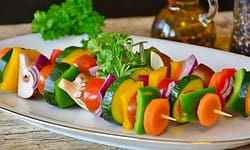
Whether you’ve read PETA’s literature, discovered Alicia Silverstone’s commercial afterward, or desire to lose weight, becoming a vegan sounds like a healthy and environmentally friendly alternative. In reality, this non-animal lifestyle includes free cholesterol and 1/20 or less of the space needed for beef. Indeed, if you may get all the Benefits of Going Vegan, you need to carefully look at your diet.
 There have been some misconceptions about how people become vegan. In this case, it would be best to reevaluate your vegan life, so you can avoid these lists of the four biggest mistakes people make when transitioning to a vegan lifestyle below. This way, you can also correct how to make a smart transition and do it better.
There have been some misconceptions about how people become vegan. In this case, it would be best to reevaluate your vegan life, so you can avoid these lists of the four biggest mistakes people make when transitioning to a vegan lifestyle below. This way, you can also correct how to make a smart transition and do it better.
Fake Meat and Potatoes Syndrome
 People who choose to be vegan often use Tofu and veggie burger to serve as fake meat. Provided these food sources can go well as transition diets, they are also free of wheat gluten and soy. These food sources offer plant-based protein options with low fat, but consuming both at every meal raises the likelihood of not feeling well on a vegan intake plan. People who have not previously experienced soy or wheat sensitivities may feel some symptoms if both appear at every meal.
People who choose to be vegan often use Tofu and veggie burger to serve as fake meat. Provided these food sources can go well as transition diets, they are also free of wheat gluten and soy. These food sources offer plant-based protein options with low fat, but consuming both at every meal raises the likelihood of not feeling well on a vegan intake plan. People who have not previously experienced soy or wheat sensitivities may feel some symptoms if both appear at every meal.
Your whole body loves variety. The vegan expert won’t be hesitant to say that they eat more food variation than being omnivorous in the past. Try to be out of the potato and meat. Vegetable casseroles, smoothies with hemp powder, salads with nuts, and many ethnic dishes will give you plenty of food and nutrients without depending only on wheat and soy. If you want to be conventional at a Fourth of July party or perhaps a family dinner with omnivores, you can certainly keep up with the meat analogs. But let’s embrace Mother Earth’s generosity that vegans don’t live (well) without gluten or soy regardless.
No Need Vitamin Syndrome
 For many new vegans, this may be valid for a while. However, there are some nutrients to pay special attention to, such as B vitamins, calcium, magnesium, and iron. While you may have reserves of B-12, your levels can fall into dangerous ranges without your consumption of animal-based foods. Low B-12 levels can lead to anemia, fatigue, mood swings, high homocysteine levels causing a heart attack, and psychological confusion. If you’re feeling exhausted after a few months or weeks of daily vegan life, a B-12 and a B vitamin complex can boost your energy.
For many new vegans, this may be valid for a while. However, there are some nutrients to pay special attention to, such as B vitamins, calcium, magnesium, and iron. While you may have reserves of B-12, your levels can fall into dangerous ranges without your consumption of animal-based foods. Low B-12 levels can lead to anemia, fatigue, mood swings, high homocysteine levels causing a heart attack, and psychological confusion. If you’re feeling exhausted after a few months or weeks of daily vegan life, a B-12 and a B vitamin complex can boost your energy.
Although research shows that irons and calcium levels are similar in vegans and those on a regular diet, many suffer from nausea and precursors to osteoporosis. Consume adequate amounts of best vitamins by absorbing green smoothies, devouring at least one salad a day (and chewing well), and consuming calcium and iron substations such as spinach, broccoli, and kale. Legumes and tiny doses of blackstrap molasses provide additional iron-boosting strategies.
However, take an honest look at your daily diet. If you don’t apply these things many times a day, consider incorporating them with a vegan multivitamin. Your diet will make it easier to absorb zinc. Since you are vegan, if you get sick often, have skin problems, or have a less sexual experience, make sure your multivitamin contains zinc. In case you choose to use another supplement, talk to your doctor initially. Zinc overdose can be dangerous.
Low Fat, No Fat, and Wrong Fat
Many people must know the advantages of Omega-3 Fatty acids. In this case, your body still needs this nutrient even though you do not eat fish. You can try eating flax seeds and walnuts to balance your omega-3 fatty acids source with the omega-6 fatty acids. It is crucial because the imbalance of both fatty acids can be dangerous, leading to mental decline, low immunity, mood swings, sore joints, and many other health problems. You can also consume algae, from which fish get their omega-3 fatty acids, so it provides excellent plant fats.
